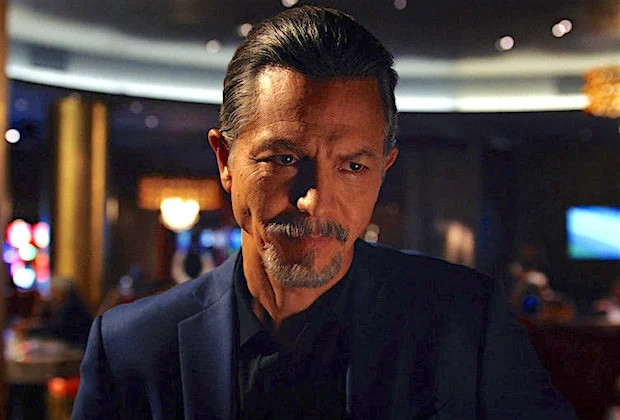When asked about a favorite song, some demur, overwhelmed by choices. Not me. My steadfast answer is “Hook” by Blues Traveler. Not for its sonic perfection—though it’s undeniably catchy—nor for deep personal resonance. My adoration stems from its sheer lyrical brilliance. I’ve written about it before and even discussed it on podcasts.
 Natasha Lyonne as Charlie and Benjamin Bratt as Cliff in Poker Face finale, highlighting the use of Blues Traveler's song "Hook"
Natasha Lyonne as Charlie and Benjamin Bratt as Cliff in Poker Face finale, highlighting the use of Blues Traveler's song "Hook"
Therefore, Benjamin Bratt’s character weaving “Hook” lyrics into a monologue in the Poker Face season finale—titled “Hook”—ignited pure joy. Yet, I question if Rian Johnson and his team fully grasped the song’s essence. Their deployment in the episode aimed for a tone described as “funny, but it’s also frightening,” which seems somewhat at odds with the song’s actual message.
Rian Johnson, the finale’s writer, offered a different rationale. He told THR via email, “The whole episode is kinda about the format of the show, and the addictive little hooks in life that pull us into situations. These catchy little tunes, hip three-minute ditties — that also describes each episode of Poker Face … So, using the episode to look at the format of the show and the actual effects on Charlie’s life being caught in that seemed interesting.”
This aligns more closely with John Popper’s original intent, but still misses a layer. “Hook” is about artistic compromise, selling out to formula. It’s not about inherent quality or profound meaning, but about mechanically delivering audience expectations, pre-programmed desires. It’s likened to Pachelbel’s “Canon,” and “Hook”‘s genius lies in its self-aware sell-out nature. Popper essentially declares his song as manufactured, feeding listeners what they’re conditioned to crave, implying a lack of discernment.
Consider these lyrics:
It doesn’t matter what I say
So long as I sing with inflection
That makes you feel I’ll convey
Some inner truth or vast reflection
But I’ve said nothing so far
And I can keep it up for as long as it takes
Popper argues that lyrical substance is irrelevant. The “hook”—the catchy melody, the pop sensibility—is what ensnares the listener, dominating their mind for days. The sincerity is confessed as absent:
I am being insincere
In fact I don’t mean any of this
Popper crafted the quintessential algorithmic pop song, anticipating MTV’s embrace, even as he satirized the very content MTV then championed:
What you’re doing to me, this MTV is not for free
It’s so PC it’s killing me
This isn’t about artistic integrity or creative inspiration. Luck is irrelevant. It’s a cynical bow to the algorithm of popular taste.
And when I’m feeling stuck and need a buck
I don’t rely on luck because
The hook brings you back
“Hook” transcends mere song; it’s a metafictional masterpiece—”the greatest f**k-you metafictional song in the history of music.” Lines like “I wanna bust all your balloons / I wanna burn all your cities to the ground” reveal a rebellious undercurrent masked by pop sheen. It’s musical close-up magic—”suck it in suck it in suck it in”—a bold declaration of manipulative intent, akin to Babe Ruth predicting a home run. Popper is knowingly deceiving us, guaranteeing the song’s inescapable catchiness, our helplessness against its pull.
Because that hook brings you back
I ain’t tellin’ you no lie
The hook brings you back
On that you can rely
Its brilliance lies in this meta-commentary. Its connection to Poker Face deepens this. The series, undeniably clever, is also a product, skillfully packaged with proven elements: murder, a unique premise, satisfying resolutions—a formula. Instead of Pachelbel, its structure is set to “Columbo,” another reliable framework. Rian Johnson, like Popper, isn’t relying on chance. He’s delivering precisely what audiences are conditioned to desire—55-minute mystery episodes—and reaping considerable financial rewards for this calculated approach. The use of “Hook” in Poker Face isn’t just a clever song choice; it’s a metafictional wink acknowledging the hooks that bind both pop songs and popular television.
